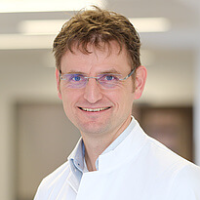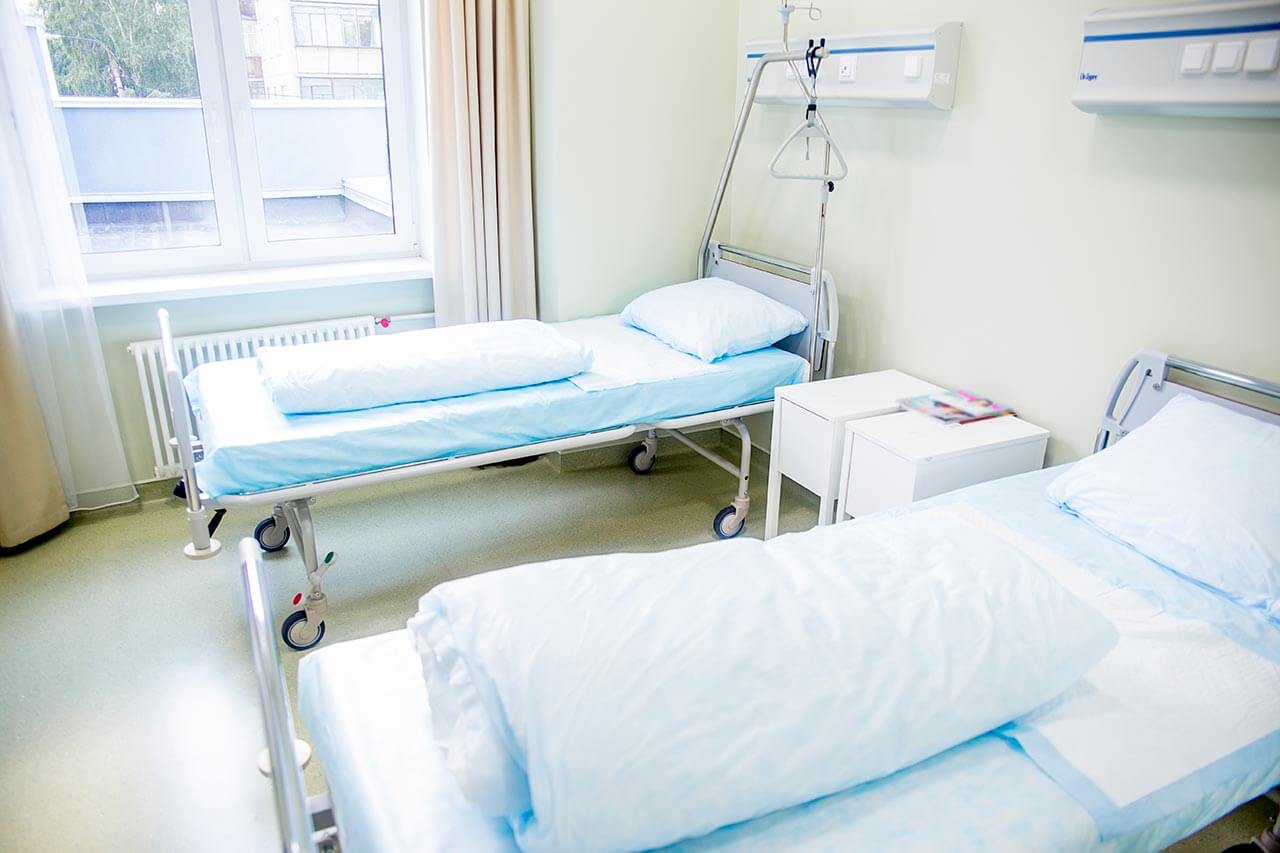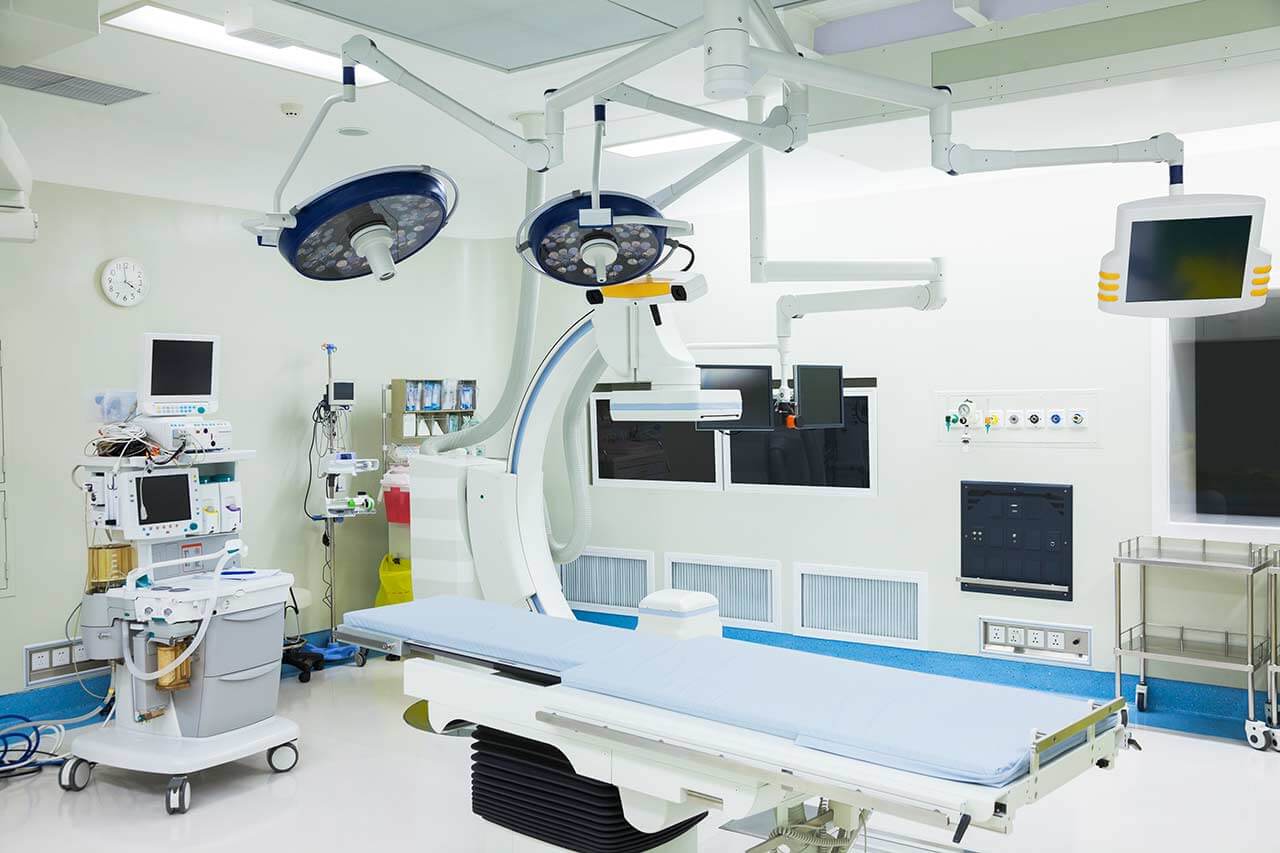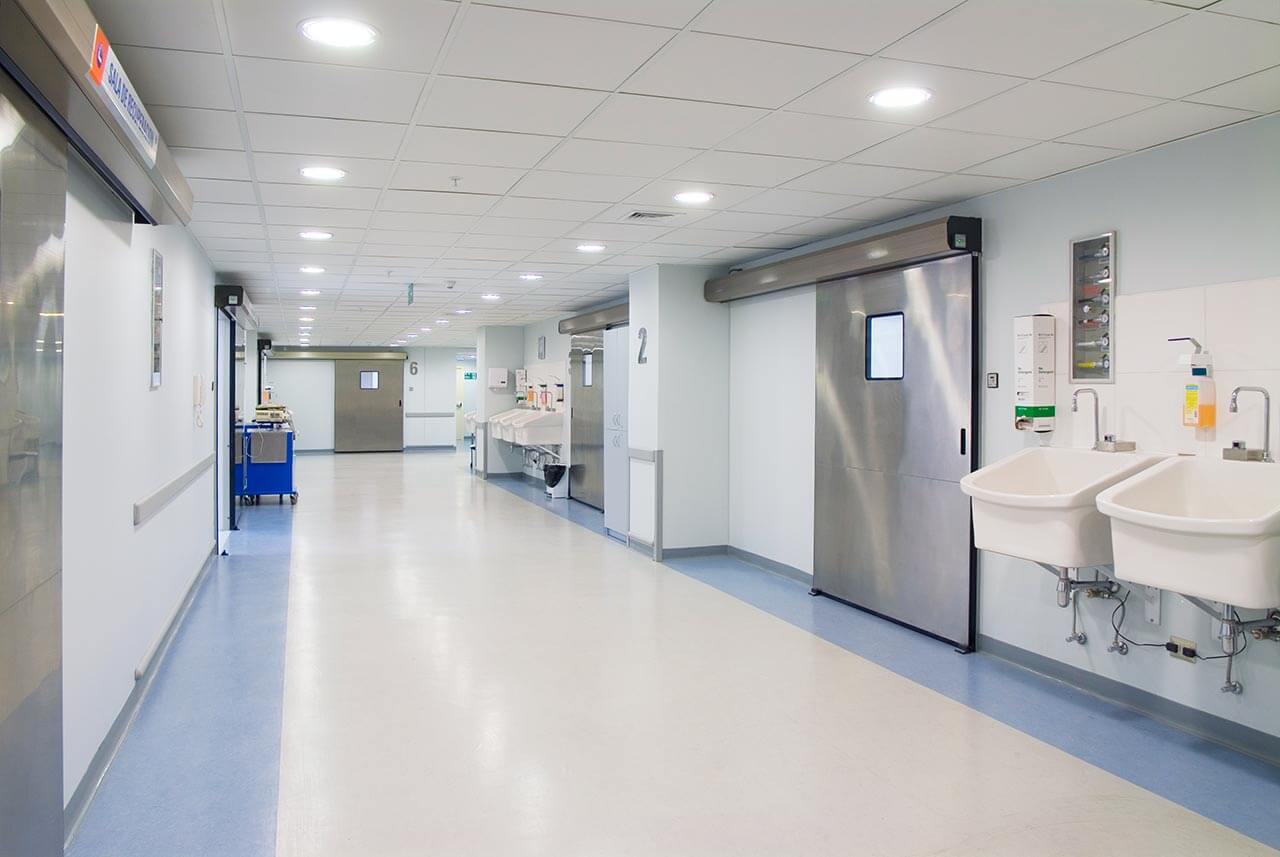
The program includes:
- Initial presentation in the clinic
- clinical history taking
- physical examination
- review of medical records
- cardiological examination
- laboratory tests:
- complete blood count
- general urine analysis
- biochemical analysis of blood
- TSH-basal, fT3, fT4
- indicators of inflammation
- indicators blood coagulation
- measurement of arterial blood pressure
- electrocardiogram
- holter monitoring (24h)
- transesophageal echocardiography
- cardiac catheterization
- preoperative care
- replacement of aortic valve
- symptomatic treatment
- control examinations
- the cost of essential medicines and materials
- nursing services
- full hospital accommodation
- explanation of future recommendations
Required documents
- Medical records
- Echocardiography (if available)
Service
You may also book:
 BookingHealth Price from:
BookingHealth Price from:
About the department
The Department of Cardiac Surgery at the University Hospital Oldenburg provides a full range of surgical treatment in its area of specialization. Special emphasis is placed on heart valve repair and replacement surgery, coronary artery bypass grafting, thoracic aortic surgery, adult congenital and acquired heart disease surgery, pacemaker and defibrillator implantation, and artificial heart implantation for severe heart failure. Many heart operations are performed using minimally invasive techniques, which has a positive effect on the healing of the surgical wound. Minimally invasive cardiac procedures also reduce surgical risks and contribute to a rapid recovery of the patient in the postoperative period. Surgical treatment of cardiac pathologies is performed in advanced operating rooms equipped with the latest technology. The cardiac surgeons of the department successfully perform routine and complex surgical procedures, saving the lives of thousands of patients. The specialists work in accordance with current clinical protocols and follow the recommendations of the German Society for Thoracic and Cardiovascular Surgery (DGTHG). The Head Physician of the department is Prof. Dr. med. Andreas Martens.
The most popular surgical procedure in the department's clinical practice is coronary artery bypass grafting (CABG). The department performs more than 900 of these procedures annually. CABG is the most effective method of treating ischemic heart disease, in which hypoxic damage to the heart muscle (myocardium) occurs against the background of coronary artery stenosis or occlusion. The department performs all currently available modifications of CABG: the classical version of coronary artery bypass grafting using a heart-lung machine, off-pump coronary artery bypass grafting (OPCAB), minimally invasive direct coronary artery bypass grafting (MIDCAB), and a hybrid CABG technique combining the use of open surgical techniques and catheter-based procedures. The purpose of coronary artery bypass grafting is to provide an additional arterial blood supply to the heart muscle by bypassing the diseased coronary artery. The optimal CABG technique for each patient is determined on an individual basis. Whenever possible, OPCAB or MIDCAB techniques without the use of a heart-lung machine are preferred.
The department's cardiac surgeons are highly skilled in the surgical treatment of aortic and mitral valve disease, which often requires removal of the affected heart valve and subsequent implantation of a biological or synthetic prosthesis. The department's specialists also perform operations to repair heart valves, when surgeons seek to preserve the patient's own heart valve. When heart valve repair or replacement is necessary, the experienced physicians in the department review each clinical case individually and select the optimal surgical technique. The department prioritizes minimally invasive procedures to repair and replace the aortic and mitral valves. These procedures are performed through a minimally traumatic 5-6 cm incision, which results in rapid healing of postoperative wounds and eliminates the respiratory problems associated with open sternotomy.
The department offers an innovative method of aortic valve replacement – transcatheter aortic valve implantation (TAVI). The surgical procedure is performed using catheter-based techniques without opening the sternum and without the use of a heart-lung machine. The TAVI procedure is highly safe and its effectiveness is comparable to that of open-heart surgery.
One of the department's main areas of expertise is the surgical treatment of thoracic aortic disease. The department performs classical open and endovascular interventions on the aorta (in cooperation with doctors from the Department of Interventional Radiology). Specialists successfully perform thoracic endovascular aortic repair (TEVAR) for the treatment of aneurysms and aortic dissections. The essence of the surgical procedure is the implantation of a stent graft to strengthen the blood vessel wall at the site of the aneurysm and prevent aortic rupture. Depending on the complexity of the clinical case, the surgery is performed under general or local anesthesia. The procedure takes 1-2 hours.
An integral part of the department's clinical practice is the treatment of heart arrhythmias. Cardiologists work closely with electrophysiologists in the diagnosis and treatment of this spectrum of pathologies. Surgical treatment of arrhythmias includes implantation of pacemakers, event recorders, and defibrillators. The department's cardiac surgeons perform about 1,000 surgical procedures per year in this area, which indicates a high level of professionalism and successful treatment results.
The department's range of surgical services includes the following:
- Coronary artery bypass grafting
- Classical coronary artery bypass grafting using a heart-lung machine
- Off-pump coronary artery bypass grafting (OPCAB)
- Minimally invasive direct coronary artery bypass grafting (MIDCAB)
- Hybrid coronary artery bypass grafting technique combining open surgical techniques and catheter-based techniques
- Surgery for heart valve disease
- Minimally invasive aortic and mitral valve replacement surgery, including the innovative TAVI procedure
- Minimally invasive aortic and mitral valve repair surgery
- Surgery for thoracic aortic disease
- Thoracic endovascular aortic repair (TEVAR)
- Surgery for peripheral artery disease
- Carotid artery surgery
- Iliac artery surgery
- Femoral artery surgery
- Surgery for congenital and acquired heart defects in adults
- Atrial septal defect surgery
- Ventricular septal defect surgery
- Left ventricular aneurysm surgery
- Surgery for tumors of the heart and nearby organs (in collaboration with specialized surgeons)
- Surgery for heart arrhythmias
- Surgery for the implantation of 1-, 2-, and 3-chamber pacemakers and defibrillators
- Surgery for the implantation of an event recorder
- Radiofrequency catheter ablation
- Surgery for heart failure
- Ventricular assist device implantation
- Artificial heart implantation
- Surgical treatment of respiratory failure
- Extracorporeal membrane oxygenation (ECMO)
- Other surgical options
Curriculum vitae
Higher Education and Professional Career
- 1996 - 2002 Medical studies, Hannover Medical School.
- 12.2002 - 05.2004 Internship, Department of Cardiothoracic Surgery, Hannover Medical School; Department of General Surgery, Hospital Oststadt Hannover.
- 01.06.2004 Admission to medical practice.
- 14.07.2004 Thesis defense and doctorate.
- 2002 - 2011 Residency in Cardiac Surgery, Department of Cardiothoracic Surgery and Transplant Surgery, Hannover Medical School.
- 2004 - 2023 Surgeon (specialization: chest organ transplantation), German Organ Transplantation Foundation (DSO).
- 2006 - 2008 Assistant Physician, Department of Cardiothoracic Surgery and Transplant Surgery, Hannover Medical School.
- 2009 - 2021 Board Member (2009-2019 – Research Fellow; 2017-2021 – Member of the Habilitation Preparation Group), Surgery Center, Hannover Medical School.
- 30.03.2011 Board certification in Cardiac Surgery, Medical Association of Lower Saxony.
- 2011 Senior Resident, Intensive Care Unit, Department of Cardiothoracic and Transplant Surgery, Hannover Medical School.
- 2011 - 2023 Deputy Radiation Protection Specialist, Department of Cardiothoracic and Transplant Surgery, Hannover Medical School.
- 01.2012 - 10.2022 Senior Physician (specialization: thoracic aortic surgery), Department of Cardiothoracic and Transplant Surgery, Hannover Medical School.
- 07.2012 Advanced training in minimally invasive heart valve surgery, Massa, Italy.
- 01-02.2013 Advanced training in open and endovascular aortic surgery, Cedars-Sinai Medical Center, Los Angeles, USA.
- 06.2016 Founding Member of the Hans Borst Academy.
- 08.03.2017 Habilitation and Venia legendi in Cardiac Surgery.
- Since 01.2020 Member of the Commission for the Promotion of the Education of Talented Medical Students and Advanced Training, German Society for Thoracic and Cardiovascular Surgery (DGTHG).
- 01.2020 - 03.2023 Managing Senior Physician, Department of Cardiothoracic Surgery and Transplant Surgery, Hannover Medical School.
- Since 02.2020 Member of the Commission for Aortic Surgery, German Society for Thoracic and Cardiovascular Surgery (DGTHG).
- Since 2020 Member of the Aortic Dissection Working Group, European Association for Cardio-Thoracic Surgery (EACTS).
- 09.2020 Extraordinary Professorship, Hannover Medical School.
- Since 2020 Member of the Scientific Advisory Board for Aortic Surgery.
- 10.2022 - 10.2023 Head of the Section for Thoracic Aortic Surgery, Department of Cardiothoracic Surgery and Transplant Surgery, Hannover Medical School.
- Since 11.2023 Head Physician, Department of Cardiac Surgery, University Hospital Oldenburg.
Clinical Interests
- Surgical treatment of thoracic aortic diseases.
- Surgical treatment of aortic valve diseases and aortic root dissection.
- Surgical treatment of coronary artery diseases.
Research Interests
- Aorta and aortic valve surgery, including aortic valve repair.
- Minimally invasive methods in aortic and heart valve surgery.
- Myocardial revascularization.
- Treatment of heart pathologies with stem cells.
Photo of the doctor: (c) Klinikum Oldenburg AöR
About hospital
The University Hospital Oldenburg is a multidisciplinary medical complex offering top-notch services of the European standard. The hospital has 20 specialized departments, 15 highly specialized centers, and more than 10 institutes. The hospital provides services in almost all areas of modern medicine: general and abdominal surgery, cardiac surgery, orthopedics, traumatology, cardiology, oncology, dermatology, gastroenterology, gynecology, mammology, urology, and pediatric and adolescent medicine.
The hospital has 832 beds, and many diagnostic and therapeutic procedures are performed on an outpatient basis. More than 150,000 patients are treated here annually, 37,000 of them receive medical care in a hospital setting. The medical complex has a highly professional medical team of more than 2,900 employees and most departments are headed by professors with extensive clinical experience.
The hospital is home to one of the best comprehensive cancer centers in Germany (Nordwestdeutsches Tumorzentrum), certified according to the requirements of the German Cancer Society (DKG). The center successfully treats breast cancer, prostate cancer, colorectal cancer, pancreatic cancer, esophageal cancer, head and neck tumors, skin tumors, and other oncological diseases. The center uses modern cancer treatment methods with proven effectiveness and also offers allogeneic and autologous bone marrow transplantation for the treatment of severe hematologic diseases (European certification JACIE).
The University Hospital Oldenburg is an expert medical facility in robotic surgery. The hospital has a specialized da Vinci Surgery Center, where gastrointestinal, urological, and gynecological diseases are treated with excellence. Patients are operated on by highly qualified professors with in-depth expertise and extensive experience in robotic surgery.
The University Hospital Oldenburg is one of the leading medical institutions in Germany because it offers excellent medical and technical resources, qualified personnel, and a comfortable infrastructure designed with the needs of patients in mind. The hospital's physicians treat patients with complex clinical cases and achieve incredible results.
The basis of medical care in the hospital is humane attitude to the patient, empathy and understanding of his needs. During the therapeutic process, the patient is surrounded by care and, if necessary, receives professional psychological support.
Photo: (с) depositphotos
Accommodation in hospital
Patients rooms
The patients at the University Hospital Oldenburg stay in comfortable single, double, and triple rooms. Each patient room has an ensuite bathroom with a toilet and a shower. The patient rooms have a TV, a telephone, and Wi-Fi. The patient rooms in the pediatric departments are designed in an appropriate interior to make the young patients feel as comfortable as possible. A child can stay in the same room with one of the parents.
The hospital has an excellent infrastructure: there is a pharmacy, a hairdresser, an ATM, and a library with audio books, DVD movies, and board games.
Meals and Menus
The hospital offers delicious and balanced meals three times a day: breakfast, lunch, and dinner. Since 2022, a new menu "Vitalessen" has been introduced here, which excludes the addition of preservatives, dyes, and flavor enhancers to food. The menu takes into account all preferences and wishes of the patients.
There is also a cozy cafe in the hospital, where you can enjoy a tasty snack or a cup of aromatic coffee or hot tea with dessert.
Further details
Standard rooms include:
![]() Toilet
Toilet
![]() Shower
Shower
![]() Wi-Fi
Wi-Fi
![]() TV
TV
Religion
There is a chapel on the ground floor of the hospital where Catholic and Evangelical services are held regularly. Services by representatives of other religions are available upon request.
Accompanying person
Your accompanying person may stay with you in your patient room or at the hotel of your choice during the inpatient program.
Hotel
You may stay at the hotel of your choice during the outpatient program. Our managers will support you for selecting the best option.




